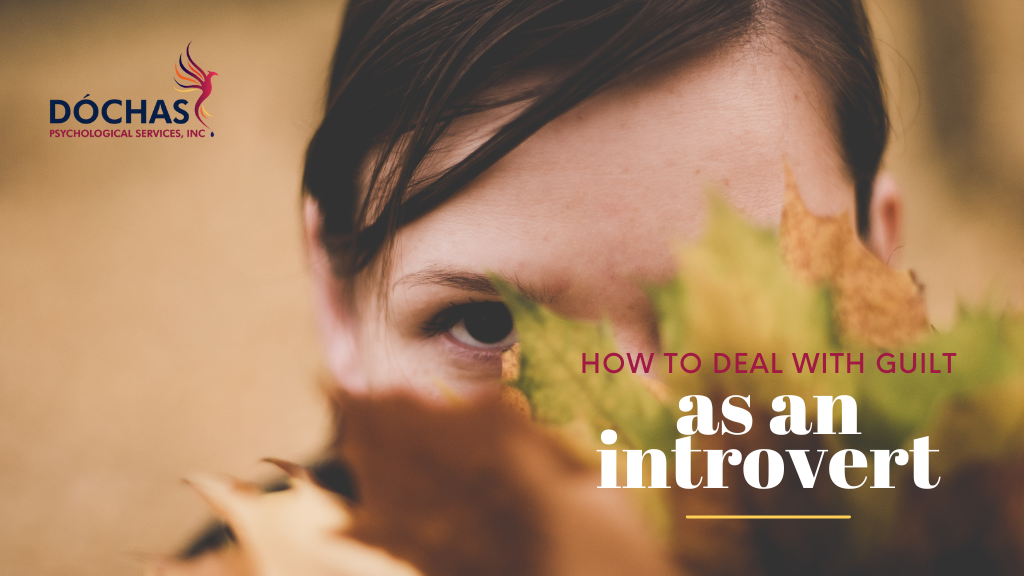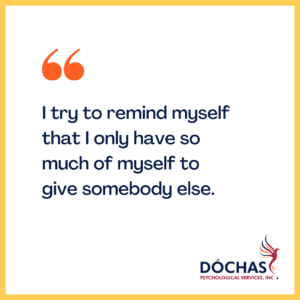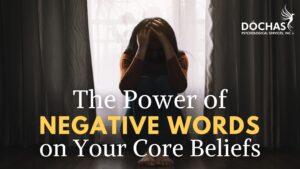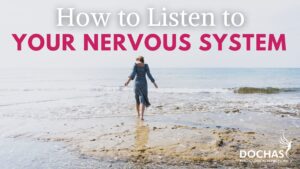Do you ever feel like you have to apologize for being who you are? It’s Kim here on the Dóchas blog, and I’m going to talk about how to deal with the guilt when you are an introvert. When you say “no” to something that your extroverted partner or friend really wants you to do or be involved in, you can feel guilty! Watch my video below, or read on to learn more about how to navigate this.
I often jokingly say that I am an introvert that’s learned to function in an extroverted world. I often feel like I have to apologize for setting a limit about what I’m able to do and what I’m able to not do. And so that sometimes causes tension in my relationships with others, and it leads to a lot of feelings of guilt. I feel like I should be able to do more, and I feel like social situations shouldn’t be so hard for me.
So here are a few tips that can be helpful. I also found this article on guilt really useful when I was trying to figure out things on my own, so I’ll refer to it throughout this!
Does My Guilt Have a Purpose?
First of all, guilt actually has a purpose. I know that sounds strange because guilt makes us feel really awful, but the purpose of guilt is to actually help us fit in socially. Our social relationships were really important for our survival, evolutionally speaking. If we weren’t accepted in those relationships, then our chance of survival decreased. Also, we need emotional connections in order to feel good about ourselves and to know who we are. So guilt is actually meant to kind of give us a nudge—maybe you’ve done something that would end up excluding you from the group.
The problem is, most of the time the things that we feel guilty about aren’t things that put anybody else in harm’s way. So the first thing that I try to do is I try to recognize what is my guilt trying to tell me. Did I actually do something wrong? Or did I actually not do enough, or warn somebody enough about what my limits were?
Most of the time it leads me to the second thing, which is that I find I feel guilty because I’m taking responsibility for somebody else’s emotions and somebody else’s reaction. And those are things that I don’t actually have control over. So the first thing I do to recognize if guilt has a purpose.
Is My Guilt for Something I Can Control?
The second thing that I try to do is I try to recognize, is this within my control or is it actually not? Somebody else’s emotions are not actually within my control. I can do things to try to limit the impact if that’s important to me, but how they react is actually not my responsibility. I don’t create how somebody else reacts or responds. That’s them. That’s based in their history and their belief about themselves and their belief about our relationship.
One strategy a previous therapist taught me is called a decision tree. She invited me to ask myself, whose problem is it? For example, if I tell a friend, “You know what? I can’t make that event. That’s gonna be too crowded for me. It’s just overwhelming for me right now with the amount of energy that I have.” And then let’s say that that friend becomes angry or really disappointed. And they, “Well, I really wish you would’ve come. I never get to see you.” At that point I need to ask myself, okay, whose problem is that reaction?
The part that is her problem is her emotional reaction. She’s allowed to be disappointed, but it’s her job to deal with that disappointment without me trying to fix it. I’ve set my limit for what I’m needing. But the part that I have to own is my response to her response, if that makes sense. My feeling of guilt, or my feeling of anger at feeling the pressure, or disappointment in myself—all of those things are my responsibility to deal with. And so that’s what I’m going to own without trying to change the other person. I might talk to my therapist, or use another coping mechanism, but that’s the part I will own and deal with.
Am I Feeling Guilty for Something I Couldn’t Have Known?
I also try to not judge myself, thinking I should have known when I couldn’t have known. I couldn’t have known that that person was going to react that way, right? So I try to not own, “Oh, I should have known that she would’ve been disappointed.”
How am I supposed to know that? She could’ve responded with anger. She could’ve responded with being okay. I can’t predict that person’s reactions all the time. That’s mind-reading. And that’s not great.
Knowing My Limits
The other thing that I really, really try to do is I try to remind myself that I only have so much of myself to give somebody else. If I go to this event but there’s another event that I promised I would go to, I may not have enough social energy and reserves to be able to meet my other commitments. So in order to be a better friend, I need to be able to be honest and say, “Look, I can’t come because I have this event, and doing both will overwhelm me. But the next event for you—let’s talk about when we can meet up again later.”
So that way I’m being considerate of what my friend is needing without overpromising what I actually have in my energy reserves.
Putting It All Together
Let me just review those three things that I use and focus on. The first thing is I try to recognize what is the purpose of my guilt. The other thing that I try to do is use that decision tree. Whose problem is it? And then I only own responsibility for the part that is mine, which is my reaction. And then the third thing is being aware that I can’t be everything to everybody and expect that I’m going to do a good job of that.
In the article I mentioned at the beginning, it says, “Blaming yourself for an incident that was only partially in your control means that you’re angry at yourself for things that are beyond you.” And really that is what it is—it’s disappointment in myself that I can’t be what other people want me to be. And it shows a lack of acceptance of my own introversion.
So overall I give myself grace that it’s okay that I say “no” and, again, let other people own their own responses for that. But I still stay open to having a discussion with them without the guilt trip or the anger or any of that.
It’s not easy, but I know you can do it. So I invite you to even pick one of those tips and try it the next time that you are feeling pretty bad, or the next time you feel like you make other people uncomfortable just because you’re you and you’re an introvert. So, introverts unite! There’s nothing wrong with us.
Until next time, please take care of yourself. If you need a professional helping hand navigating introversion and guilty, reach out to us with any questions you might have. You can contact the clinic by emailing info@dochaspsych.com or calling us at 780 446 0300.
About Dóchas Psychological
Dóchas Psychological Services is a well-established and trusted therapy clinic located in Spruce Grove, Alberta. At Dóchas we value the idea that everyone deserves a safe space. Through connection and education, our team works hard to build a trustworthy relationship with each of our clients. It is our goal to create a community for our clients to feel like they belong.
Disclaimer
Information provided through Dóchas Psychological Services blogs or vlogs is meant for educational purposes only. They are NOT medical or mental health advice. You can read more about our disclaimer here.











